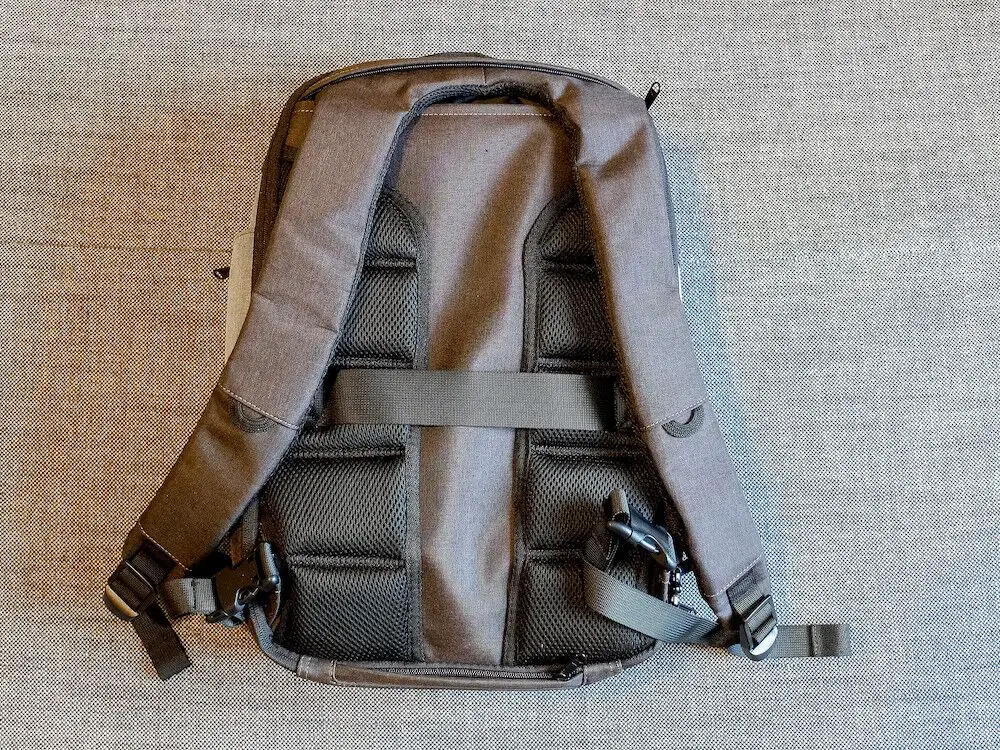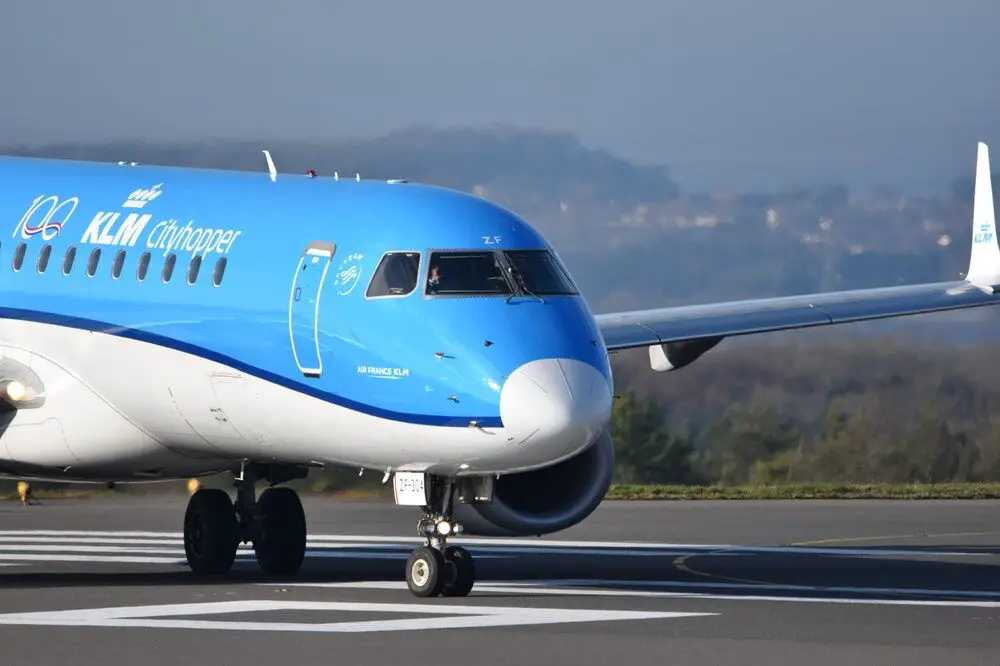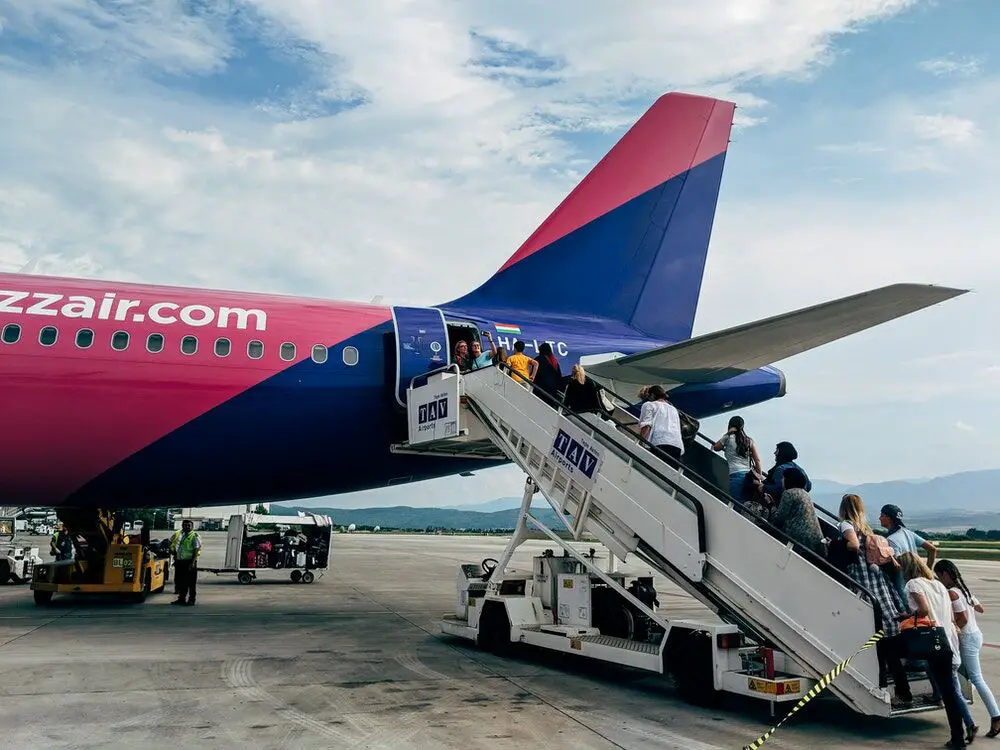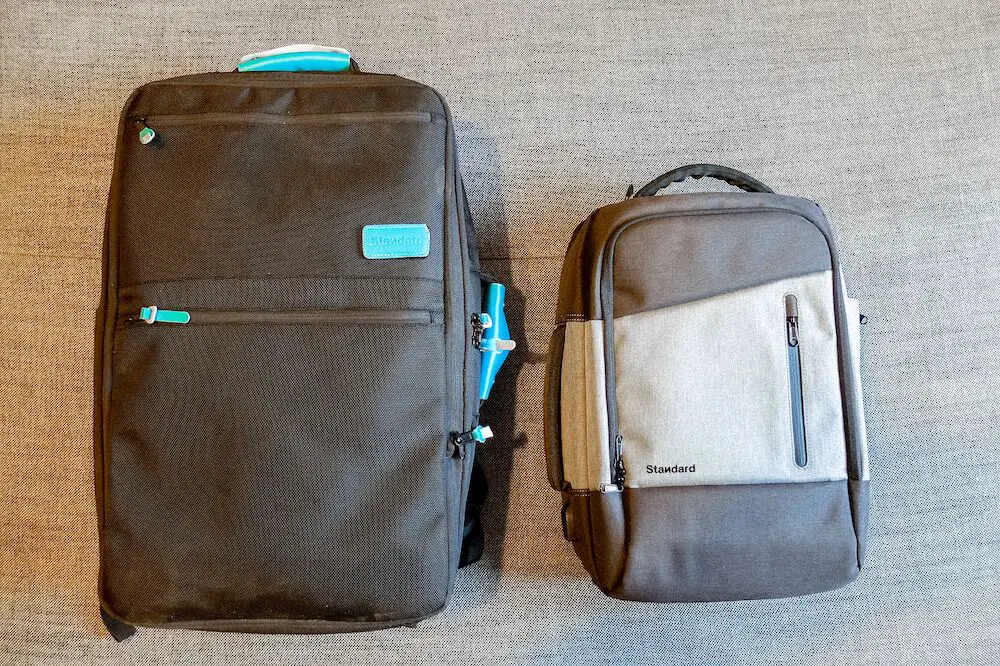Baggage and connecting flights, what’s the procedure?
What happens with baggage on connecting flights? What if there’s not one but several airlines? Do you have to claim baggage on a connecting flight with several airlines? What’s the self-transfer flights baggage procedure? These are important questions, and many of you have asked those questions. So today, in this guide, we are going to answer all of those questions.
- Airline-protected connecting flights
- Self-transfer flights (mostly with low-cost airlines)
- Flights with different airlines
- Delayed or Lost Baggage on Connecting Flights
Flight delay? Cancellation? Denied boarding? File a claim online.

1. Baggage on Connecting Flights
Connecting flight baggage are simple.
First, what type of connecting flight do you have?
There are two types of connecting flights:
- Airline-protected connecting flights
- Self-transfer flights
What are the carry on bag policies on connecting flights? What is the carry on procedure? See our separate guide on carry-on bags / baggage.
1.1 Baggage on Airline-Protected Connecting Flights
These are the best connecting flights.
In fact, these are the only “proper connecting flights”. Full-service traditional airlines sell airline-protected connecting flights. This is when you make one booking and have two or more flights.
For example, you have a flight from London to Bangkok, via Frankfurt, with Lufthansa. A total of two flights, both operated by one airline. Or, you have a flight from Riga to Bangkok, via Stockholm and Doha, with Qatar Airways. A total of three flights, one operated by airBaltic, two — by Qatar Airways. In this case it doesn’t matter — rules are the same on connecting flights with different airlines.
What happens with baggage on connecting flights like this?
- Airline takes care of your baggage. You don’t have to worry about connecting flight baggage transfer, it’s done by your airline.
- You check in baggage only once for the whole journey. You do it at the airport of departure, and that’s all. And it’s being taken to your final destination. You don’t have to recheck it in between flights.
- You are told about that at check in. You can also see that on the baggage tag, that piece of paper they usually attach to your boarding pass — it says the final destination of your baggage.
That’s the beauty of international connecting flight baggage transfer with full-service airlines. It’s all super simple and convenient. It’s done by airport staff, and they transfer baggage between airlines too (on protected connecting flights).
Only on very rare occasions, you have to recheck it.
One such exception is when traveling through the US.
Only on very rare occasions, you have to recheck baggage. One such exception is when traveling through the US. When traveling through the US, you also have to have either an ESTA or US transit visa, don’t forget about that.
1.2 Baggage on Self-Transfer Connecting Flights
In this case, your baggage is your responsibility.
If you book flights directly from airline, it’s super easy and clear. You made two reservations with Wizz Air, and now you have two flights with Wizz Air. It’s a self transfer. You can book self transfers also with traditional airlines — if you book several flights separately, as separate flights.
It may not be as straightforward with flight booking websites. There, you may have an option to buy several flights with one reservation, and you have to pay attention to details and small print — these websites and booking apps tell it somewhere if it’s a self transfer or not.
What happens with baggage on self-transfer flights?
- You collect and recheck baggage. You do it for every flight. If you have two layovers / stopovers, you will have to do it twice.
- Baggage rules for flights may differ. Especially, if these are different airlines. Make sure to check baggage rules in advance.
- You pay for baggage for every flight. If you have a total of three flights, you will have to pay for checked baggage three times. When traveling with checked baggage on low-cost airlines, sometimes this is the thing that makes people change their mind and travel with full-service airline instead. If you’re still looking for flights, make sure to compare the final price.
If you have more than a single piece of baggage, and more than a single layover, this all adds up significantly. Take this into account when planning your travel itinerary — these things take time, sometimes hours.
Read more: Are Self-Transfer Flights Safe?
1.3 Can You Collect Baggage Between Flights?
This applies only to airline-protected connecting flights.
With self-transfer flights you have access to your baggage after every flight by default. But with protected connecting flights, it might be possible only for an extra fee. For example, here’s what Air France says about this:
Your flight lands at Paris-Charles de Gaulle or Paris-Orly and your onward flight takes off from the same airport? If you wish to collect your baggage between these two flights, you will be charged €275, regardless of the number of bags, your travel cabin or the reason given.
Air France website
This is done in order to prevent people from skipping flight legs.

2. Connecting Flight Baggage Transfer: Different Airlines
One or several airlines, mostly it doesn’t matter.
Because it doesn’t affect connected flights baggage rules. If it’s an airline-protected connecting flight, you may have a flight with different airline, and it’s completely normal. Nowadays all big airlines do this — share some of their flights. Flights like these are called codeshare flights.
It doesn’t affect baggage transfer in any way.
Airlines take care of your baggage throughout the journey.
Same way with self-transfer flights. If it’s a self transfer, there’s no difference if all your flights are with one or several different airlines. The only difference is that baggage allowance may differ. Other than that, it doesn’t change anything for you — you still have to recheck baggage for every flight.
One airline or three — still, you recheck baggage yourself.
Read more: Connecting Flight Baggage Transfer: Different Airlines

3. International Flight With Domestic Connection: Baggage Rules
Less common, but still very common situation.
For example, you have a flight from London to Bangkok, and then onward to Phuket. Or, a flight from Paris to Delhi, with Air France, and then to Goa. You booked it with one airline, and it’s an airline-protected connecting flight. Do you have to collect baggage before flight to Phuket / Goa?
What happens with baggage on connecting flights like this?
It depends from the country and the airport.
You may not have to do anything with baggage.
Or, you may have to recheck baggage for the flight:
- You collect and recheck baggage. You do it at the first port of entry into the country. You also go through passport control at this airport.
- You check in bag for domestic flight. Even if it’s the same airport that your next flight is departing from, you have to check in bag yourself. In this case, unless otherwise stated by your airline, it isn’t done by an airline.
There’s no one baggage claim / connecting flight procedure regarding these situations. It’s especially important to take this into account, when traveling with baggage on international flights, and on a self-transfer connection.
What Applies to You?
Ask the staff at check-in at the airport.

4. Delayed or Lost Baggage on Connecting Flights
Checked baggage gets lost and delayed very often.
In this case, it matters whether it’s a protected connecting flight or self transfer. This determines how a situation like this is handled. In fact, it’s one of the main differences between connecting flights and self transfer.
- With protected connecting flights, your baggage will be taken to your destination. Even if it gets lost on the way, the airline will take you to your final destination. This is their responsibility.
- With self-transfer flights, it’s up to you to collect the baggage, even if it arrives 5 or 10 days later, and you are in another country. With self transfer, you will have to collect the baggage at the airport where it got lost.
In short, with connecting flights it’s more safe.
All thanks to widely-used connecting flights baggage procedure.
Read more: What Is Carry-on Bag / Baggage?
4.1 What to Do If Your Luggage Is Lost / Delayed?
First, report the loss. You should do it right away.
- Report the loss at the airport. Mostly you will find the Baggage Office at the baggage hall, near the baggage carousels.
- Keep tracking the bag online. Most of airline have special lost baggage tracking apps or websites. You will have to use a tracking code for that. You must have received it at the airport, when you registered loss of baggage.
- Lost or delayed luggage? If the bag hasn’t been found within 21 days, it’s considered lost. And, according to the Montreal Convention, you have a right to lost baggage compensation. Contact the airline to make a claim.
Having a good travel insurance may be helpful in this case. Very often it’s easier to claim compensation for problems like this from a travel insurance company than from an airline. They may also cover some other related expenses.
Read more: Lost Baggage on Connecting Flights
4.2 Baggage Compensation
If a bag is lost, you can get compensation for that.
You can receive up to around €1,300.
The amount of baggage compensation will depend on the contents of your bag. This applies to situations, when a baggage isn’t found within 21 days. These rules are the same with low cost airlines, like Wizz Air and easyJet, and with with traditional airlines like Qatar Airways, LOT Polish Airlines and British Airways.
Contact the airline to file a claim for compensation.
Alternatively, contact with your travel insurance company.
4.3 Reimbursement of Expenses
If your bag is delayed, you may have a right to reimbursement of expenses.
This applies specifically to essentials (things you have lost as a result of your baggage getting lost on the way). You have this right also with 1-day baggage delays. Keep all of your receipts, and contact the airline when your baggage is delivered and / or 21 days have passed and your bag is considered lost.
As long as it’s due to airline’s fault, not your’s.
Montreal Convention protects your baggage.
4.4 Does Luggage Get Lost on Connecting Flights?
Mostly no. Otherwise, no one would travel with baggage.
But it has been a huge problem at times. For example, in the summer of 2022 there was a lost baggage crisis in Europe, and not only in Europe. Thousands of bags got lost, or were heavily delayed, tens of thousands of travelers left angry, all because the air travel industry had been slow to rehire after the pandemic.
What is your experience with baggage on connecting flights? Baggage on self-transfer flights? Has your bag ever gone missing? How did the airline solve this? Have you ever received baggage compensation from airline?
About the author:
Kaspars is a digital nomad and travel blogger who’s been traveling the world extensively since 2013. Since 2017, Kaspars has been writing about the less-known aspects of air travel, things like air passenger rights laws and regulations. He’s really good at simplifying complex concepts and making them easily understandable. Kaspars favorite airlines are Qatar Airways and Turkish Airlines.
